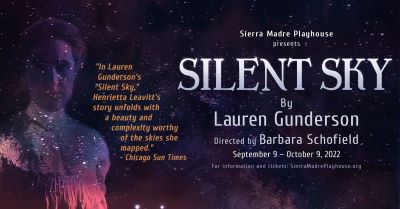THE SKY’S THE LIMIT IN THIS LOVELY PRODUCTION
Unless you are an astronomer or an astronomy buff, you likely have never heard of Henrietta Swan Leavitt. She was an American woman who made discoveries during the early 1900s that helped later scientists establish the present scale of the universe. Leavitt’s story attracted the interest of playwright Lauren Gunderson, who wrote Silent Sky, a biographical drama that Sierra Madre Playhouse is staging in one of the most informative and lovely productions of the season.
Ann Marie Wilding, Aubrey Saverino (photo by Berrie Tsang)
In two hours, Gunderson sustains our interest in Henrietta’s scientific labors as well as her personal life, avoiding melodrama or sentimentality. Henrietta’s discoveries are very high tech and Gunderson wisely avoids getting bogged down in abstruse scientific explanations. Barbara Schofield has directed the production for what it should be, an intimately scaled story of one woman’s drive against the unjust impediments placed in her path by the society of the day. There are no false notes in the understated performances — indeed, they are luminous — and plenty of humor to leaven the narrative’s rising intensity.
Ann Marie Wilding, Jack Menzies (photo by Jeanne Marie Valleroy)
Leavitt was born in 1868 and lived most of her life in New England (she died in 1921 at the age of 53). In 1892, Leavitt received a bachelor’s degree from what is now Radcliffe College. She joined the Harvard College Observatory in 1902 and spent her entire career there. Leavitt had the misfortune of being a woman when science, including astronomy, was a man’s world. At Harvard she was delegated the job of measuring and cataloguing the brightness of stars photographed by telescope onto glass plates. It was slogging work compared to the exciting researches the male scientists reserved for themselves. The lobby has a wonderful display emphasizing the contributions of women astronomers.
Ann Marie Wilding, Candida Celaya (photo by Berrie Tsang)
In an era when women were expected to be docile helpmates to the menfolk, Henrietta stood her ground. She did not suffer fools gladly and yet she was not a fiery protester like her suffragette Harvard workmate Annie Cannon. Henrietta wasn’t interested in marriage at a time when that’s what a woman’s primary goal should be. She tried to fit in, but her dogged search for knowledge came first.
Jack Menzies, Ann Marie Wilding (photo by Berrie Tsang)
In the play, Leavitt is a high-spirited young woman with a passion for scientific inquiry and a resentment toward the sexist limitations imposed on her scholarly freedom. Eventually her brilliance, her limitless work ethic, and her fierce drive for scientific discovery gained her some of the recognition she deserved. Leavitt now stands as a pioneer in the modern mapping of the universe, dismantling the scientific conviction of the time that the cosmos did not extend beyond our own Milky Way. With Leavitt’s discoveries, the sky literally had no limit. To say this production is quite inspirational is an understatement.
April Elize, Ann Marie Wilding (photo by Berrie Tsang)
Gunderson deals with this gigantic theme by cleverly writing a small play with only five characters. Other than Leavitt (a cooly subtle and fine-spun Ann Marie Wilding), there are her two colleagues working on the measuring and cataloguing project: suffragist Annie Jump Cannon (a stern on the outside, marshmallow on the inside Candida Celaya) and plucky, feisty and sarcastic Scot Williamina Fleming (a delightfully strong Aubrey Saverino). April Elize as Henrietta’s sister Margaret, a pleasant but straitlaced woman who can’t understand why Henrietta dismisses the call of marriage for arcane problems of astronomy that seem to have no relation to everyday life. Ms. Elize fills the huge task of creating their clergyman father and a family from nothing, as they don’t exist in the play; through Elize’s empathetic performance, it’s easy to imagine the totality of her life. Finally, there is Peter Shaw, Leavitt’s male supervisor and off and on romantic interest at Harvard (the ridiculously handsome, relatable, and humorous Jack Menzies). Oddly, Henrietta’s big boss, the famous astronomer Edward Charles Pickering, is mentioned often but never seen; apparently, he was instrumental in thwarting Henrietta’s early attempts to expand her work on the cosmos project (she wasn’t even allowed to use the college telescope). Some on-stage confrontational dialogue exchanges between Henrietta and Pickering might have injected stimulating debate about gender inequality and scientific inquiry in the early 20th-century American scientific community. But that’s a quibble.
Jack Menzies, Ann Marie Wilding, Aubrey Saverino (photo by Berrie Tsang)
The basic playing area avoids rooms, but with Rachel Ross-Sullivan‘s astounding props of glass photographic plates, a hearing device for Leavitt, and wooden desks more than indicate specific settings. The designers do succeed in creating a sense of time, place and universe through Schofield’s scenic design, Shon LeBlanc’s lovely period costumes, Derek Jones’s lighting, Fritz Davis‘s projections, John Dimitri and Jeanne Marie Valleroy‘s understated sound, and, especially, the glorious piano parlor original music by Jenny Giering.
It’s no small thing to write an entertaining play on a difficult and unfamiliar scientific subject but Gunderson has pulled it off. Wilding carries the play with truth and intelligence as well as charm and warmth; she has quiet command of a complex character. And the final visual moment of the production will definitely choke you up.
Silent Sky
Sierra Madre Playhouse, 87 W. Sierra Madre Blvd. in Sierra Madre
Fri and Sat at 8; Sun at 2; Sat at 2 (Sep. 24, Oct 1 & 8 only)
ends on October 9, 2022
for tickets, call 626.355.4318 or visit Sierra Madre Playhouse

